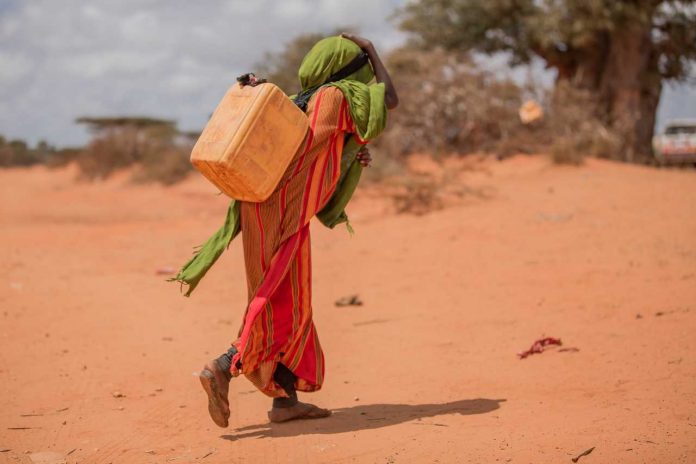Humanitarian needs in Ukraine are growing and spreading by the hour. Since 24 February, humanitarian agencies fear that several million people may have already fled their homes. The UN has confirmed that at least the one million Ukrainians have crossed the borders into neighbouring countries. While the scale and scope of displacement is not yet clear, we expect that more than 10 million people may flee their homes if violence continues, including 4 million people who may cross borders to neighbouring countries.
We continue to receive reports that civilians are trapped in towns and cities, and we are concerned about reports of people who are unable to flee. Everybody should be granted safe passage to places of their choosing if they want to leave.
Damage and destruction to civilian infrastructure in areas of active fighting and those affected by airstrikes and shelling continue to impede people’s access to water, food, healthcare, and other basic services. All parties must comply with international humanitarian law. They must take constant care to spare civilians and civilian infrastructure from harm throughout their military operations.
Humanitarian partners, including local and civil society organizations on the ground, continue to respond to people’s needs where security permits. Humanitarian operations are guided by the humanitarian principles of neutrality, impartiality, humanity, and independence. To scale up our humanitarian operations, we need safe, unimpeded access to all conflict-affected areas.
Today we also have a statement from the Humanitarian Coordinator, Ms. Osnat Lubrani. She reiterates the message that the UN is committed to scaling up support for people across Ukraine, particularly women, children, elderly people and those with disabilities, who desperately need relief, protection and shelter. The full statement is available
Ethiopia
Our humanitarian colleagues tell us that the humanitarian situation in Northern Ethiopia remains extremely concerning. In the Afar region, people continue to be displaced by ongoing fighting adding to growing needs.
During the past week, some 18,000 people received food assistance in areas affected by the conflict which are accessible, and some health services, water trucking and household items have been provided to those recently displaced. There is a need to scale up assistance. Overall, the number of people targeted for food assistance in Afar has grown to over 620,000, compared to some 530,000 who were assisted during the last round of assistance which began in mid-October.
In the neighbouring Tigray region, deliveries of aid and fuel by road through Afar remain suspended. From 17 to 23 February, no distribution of food aid was reported, as supplies and fuel have nearly run out. Some limited aid supplies do continue to be flown into Tigray. During the past week, nutrition supplies to treat severe acute malnutrition in young children were flown in – the first to arrive since mid-December. Medical supplies also continued to be flown in. This has contributed to a limited expansion in medical services. However, due to lack of fuel, only some of the medical supplies have been distributed to health facilities.
Humanitarian assistance continues to be delivered in the neighboring Amhara region. The UN and NGO partners provided food for more than 283,000 people during last week – in Dessie and Kombolcha towns and in North Gondar zone – complementing Government distributions. Overall, more than 7 million people have been assisted in the current round of food distribution which began in late December. Some areas in the north of Amhara do remain inaccessible to the UN and NGO partners due to insecurity.
Extremely concerning levels of malnutrition continue to be reported in all three northern regions.
Somalia
The Deputy Special Representative of the Secretary-General, UN Resident and Humanitarian Coordinator for Somalia, Mr. Adam Abdelmoula, expresses extreme concern about the impact of the recent hostilities in Diinsoor, South West State on civilians where over 17,400 people, many of them women and children, have been forced to flee their homes in the last three weeks.
Humanitarian actors report that those affected are also impacted by the ongoing drought emergency and are in urgent need for humanitarian and protection assistance. Almost 136,000 people are facing emergency (IPC-4) levels of food insecurity in South West State. However, scaling up response is impeded by access and funding challenges.
Mr. Abdelmoula reminded all parties of their obligations under international humanitarian law and the principles of distinction, precaution, and proportionality in the use of force and urged them to uphold these obligations. Parties to the conflict must ensure that humanitarian workers have unfettered access to all people in need of assistance.
This is occurring at a time when the country is facing the longest sequence of poor rainy seasons since 1981, with some regions experiencing extremely dry conditions following the failure of the October-December 2021 seasonal rains. About 4.3 million people are affected by the drought, of whom over 554,000 have been displaced in search of food, water, and pasture. With the next rainy season not expected until April, Somalia is staring at a potential catastrophe.
The Humanitarian Response Plan for Somalia, which seeks nearly US$1.5 billion to assist 5.5 million of the most vulnerable Somalis, is only 3.3 per cent funded ($47.5 million). The full statement is available online.
Source OCHA

